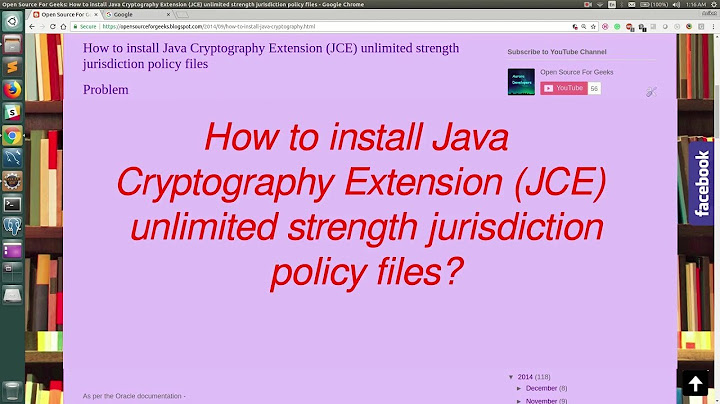How to install Unlimited Strength Jurisdiction Policy Files?
Solution 1
You need to determine your Java home path (either via System.getenv("JAVA_HOME") from Java or $ echo $JAVA_HOME on the command line). It should be a path like the following:
-
C:\Program Files\Java\jre8on Windows -
/Library/Java/JavaVirtualMachines/jdk1.8.0_101.jdk/Contents/Homeon Mac OS X -
/usr/java/jdk1.8.0_101/bin/javaon *nix
You then need to copy the US_export_policy.jar and local_policy.jar files you downloaded into the directory: <JAVA_HOME>/jre/lib/security and overwrite the existing files of the same name.
Updated 05/17/17
The following code (for demonstration purposes only) will instruct the JVM that it is allowed to use AES-256 bit encryption and corresponding TLS ciphers regardless of the policy files installed. It is not recommended to employ this method.
if (Cipher.getMaxAllowedKeyLength("AES") < 256) {
try {
Field field = Class.forName("javax.crypto.JceSecurity").
getDeclaredField("isRestricted");
field.setAccessible(true);
field.set(null, java.lang.Boolean.FALSE);
} catch (Exception e) {
fail("Could not override JCE cryptography strength policy setting");
fail(e.getMessage());
}
}
Solution 2
2018-01-15 Update
According to JDK-8170157, since JDK 6u181, 7u171, 8u161, 9b148 unlimited cryptographic policy is enabled by default. So all you have to do is just upgrade to the corresponding baseline.
Original answer
Since Java 9 and Java 8u151 there's no need to download and manually install jurisdiction policy files anymore. According to release notes:
In older releases, JCE jurisdiction files had to be downloaded and installed separately to allow unlimited cryptography to be used by the JDK. The download and install steps are no longer necessary. To enable unlimited cryptography, one can use the new
crypto.policySecurity property. If that new Security property is set in the java.security file, or has been set dynamically by using theSecurity.setProperty()call before the JCE framework has been initialized, that setting will be honoured. By default, the property will be undefined. If the property is undefined and the legacy JCE jurisdiction files don't exist in the legacy lib/security directory, then the default cryptographic level will remain at limited. To configure the JDK to use unlimited cryptography, set thecrypto.policyto a value ofunlimited. See the notes in the java.security file shipping with this release for more information.
Related videos on Youtube
Derlin
"The code that is the hardest to debug is the code that you know cannot possibly be wrong" I am a passionate woman curious about everything. From the sexuality of worms to the NP-Hard problems, my first love is knowledge in all its forms. Well, this and octopuses 🐙🐙.
Updated on May 13, 2020Comments
-
 Derlin about 4 years
Derlin about 4 yearsCan someone explain to me how to install Unlimited Strength Jurisdiction Policy Files. I downloaded .jar files from Oracle website but I'm having a problem with installing them. Java program that I'm making keeps giving me this error:
Jan 11, 2017 12:32:31 AM com.subgraph.orchid.TorClient start INFO: Starting Orchid (version: 1.0.0) Jan 11, 2017 12:32:31 AM com.subgraph.orchid.TorClient verifyUnlimitedStrengthPolicyInstalled SEVERE: Unlimited Strength Jurisdiction Policy Files are required but not installed. Exception in thread "main" com.subgraph.orchid.TorException: Unlimited Strength Jurisdiction Policy Files are required but not installed. at com.subgraph.orchid.TorClient.verifyUnlimitedStrengthPolicyInstalled(TorClient.java:208) at com.subgraph.orchid.TorClient.start(TorClient.java:79) at com.nikola.WebCrawlerApp.App$OrchidDemo.startOrchid(App.java:46) at com.nikola.WebCrawlerApp.App$OrchidDemo.access$000(App.java:38) at com.nikola.WebCrawlerApp.App.main(App.java:35) at sun.reflect.NativeMethodAccessorImpl.invoke0(Native Method) at sun.reflect.NativeMethodAccessorImpl.invoke(NativeMethodAccessorImpl.java:62) at sun.reflect.DelegatingMethodAccessorImpl.invoke(DelegatingMethodAccessorImpl.java:43) at java.lang.reflect.Method.invoke(Method.java:498) at com.intellij.rt.execution.application.AppMain.main(AppMain.java:147)-
 assylias over 7 yearsHow did you "install" them?
assylias over 7 yearsHow did you "install" them?
-






